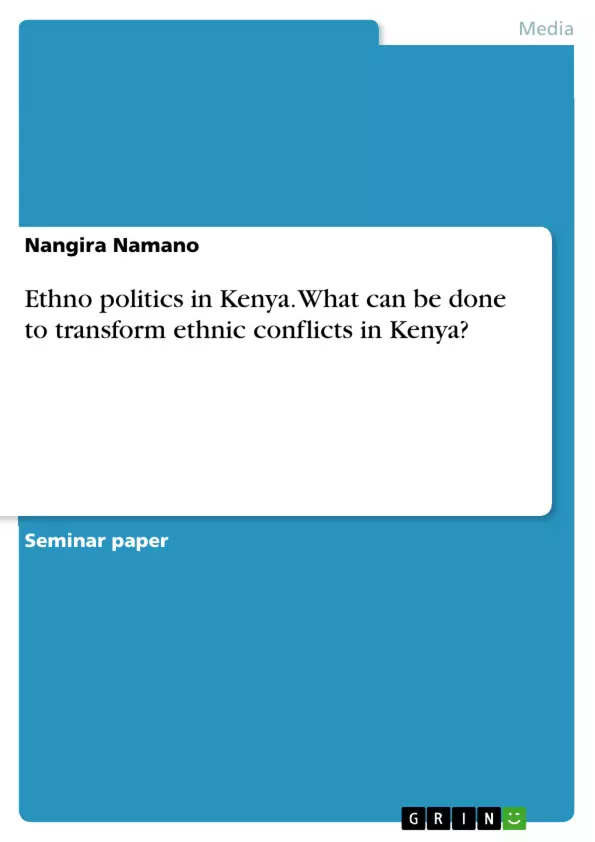The rising Ethnic politics in Kenya have been in the rise are instigated by politicians as was the case in the PEV 2008. These conflicts tend to transcend the state borders to regional and international levels thus the involvement in resolution by the external bodies like the UN, AU, EAC, IGAD among others. These negotiations and mediations may seek to understand the underlying issues, dynamics and effects experienced in the conflicts. This essay will thus seek to address the social, economic, political, religion and security as mobilizing factors of ethno politics, the consequences, and challenges of the 2008/9 post- election violence and how to transform ethnic conflicts in Kenya. The problems resulting from the 2008/9 PEV are highlighted as well as proposals with regard to institutional, legislative, social policies and reforms to better handle the necessary transformation.
The theory of ethnicity is based on primordial and instrumentalist approaches. Kenya witnessed ethnicity and political conflicts in 1992, 1997/8, 2007/8, all of which came after the coming of multi-party politics, which exacerbated ethnic competition for power and resources. Domestic conflicts are believed to ‘‘involve deep issues of ethnic and cultural identity, of recognition, and of participation that are usually denied to ethnic minorities, in addition to other values that are not negotiable.’’ Compromise is more difficult under these conditions because groups often cannot find common ground. Kenyan politics is strongly divided along ethnic lines. Parties are found to draw their support from distinct and separated ethnic groups. President Kibaki’s Party of National Unity (PNU) was mainly supported by the Kikuyu, Embu and Meru ethnic group. The Orange Democratic Movement (ODM), which combined several opposition groups headed by Raila Odinga, was supported by Luo, Luhya and Kalenjin ethnic group. As a consequence, more Kenyans value ethnicity above political ideology and policy. The perception that the party offers the best hope for a person within the ‘ascribed’ tribe to assume power and consequently share state resources with tribal members. The result of this view has historically been tribalism or prejudice across tribes, and favoritism within the tribe. An analysis of the 2007 general election in Kenya describes the voting pattern as a mere ‘ethnic census’
Inhaltsverzeichnis (Table of Contents)
- Abstract
- Economic
- Political
- Social
- Security
- Religion
- What can be done to transform ethnic conflicts in Kenya?
- Bibliography
- Footnotes
Zielsetzung und Themenschwerpunkte (Objectives and Key Themes)
This essay aims to examine the factors contributing to ethnic politics in Kenya, focusing specifically on the socio-economic, political, security, and religious aspects. It explores the consequences and challenges of the 2008/9 post-election violence and proposes solutions for transforming ethnic conflicts in Kenya.
- The role of ethnicity in Kenyan politics and its influence on power and resource allocation.
- The historical context of ethnic tensions in Kenya, including colonial legacy and post-independence events.
- The economic, political, and social factors that fuel ethnic conflicts.
- The consequences of ethnic violence, including social disruption, economic instability, and human rights violations.
- Strategies and policies for mitigating ethnic conflicts and promoting national unity.
Zusammenfassung der Kapitel (Chapter Summaries)
The essay delves into the historical context of ethnic tensions in Kenya, tracing it back to colonial times and the divide-and-rule strategy employed by the British. It examines how the scramble for Africa and the artificial partitioning of ethnic communities across borders contributed to the emergence of ethnic identities and conflicts. The text then focuses on post-independence Kenya, highlighting the influence of ethnicity in shaping political alliances and the rise of political parties rooted in specific ethnic groups. This analysis emphasizes the role of politicians in exploiting ethnic identities for their own gain, leading to recurring cycles of violence.
Furthermore, the essay explores the economic, political, and social factors that fuel ethnic conflicts. It sheds light on how the perception of unequal access to resources and opportunities can exacerbate existing tensions, leading to competition and mistrust between ethnic groups. Additionally, the analysis examines the role of political rhetoric and manipulation in fueling these conflicts, showcasing how politicians often incite ethnic divisions to achieve their objectives.
Schlüsselwörter (Keywords)
The essay's key themes include ethnic politics, ethnic conflict, post-election violence, socio-economic factors, political manipulation, historical context, colonial legacy, national unity, and conflict transformation. It explores the relationship between ethnicity and political power in Kenya, analyzing the historical development and contemporary manifestations of ethnic tensions.
Frequently Asked Questions
What caused the 2008 post-election violence in Kenya?
The violence was instigated by ethnic politics and competition for power and resources, exacerbated by political manipulation along tribal lines following the 2007 general election.
How are political parties in Kenya divided?
Parties are strongly divided along ethnic lines, with specific tribes supporting specific parties, such as the Kikuyu supporting PNU and the Luo/Luhya/Kalenjin supporting ODM.
What is the role of the colonial legacy in Kenyan ethnic conflicts?
The British "divide-and-rule" strategy and artificial partitioning of ethnic communities during the colonial era laid the historical foundation for contemporary ethnic tensions.
What are the proposed solutions for transforming ethnic conflicts?
The essay suggests institutional and legislative reforms, social policies to promote national unity, and better resource allocation to reduce tribal favoritism.
Why is voting in Kenya described as an "ethnic census"?
This description refers to the pattern where voters primarily choose candidates based on their ethnic identity rather than political ideology or specific policies.
- Quote paper
- BSc. BIT MA (ICM) Nangira Namano (Author), 2016, Ethno politics in Kenya. What can be done to transform ethnic conflicts in Kenya?, Munich, GRIN Verlag, https://www.grin.com/document/371928



